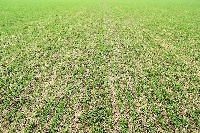Climate change is now a crucial global issue, as well as halting and changing change in human activities. In Latvia, one of the main sources of greenhouse gases (GHGs) is agriculture, which accounts for 24% of all national GHG emissions, including Latvia and the country with the second largest share of agricultural GHG emissions in the European Union. Therefore, for the second year, Latvian Fund for Nature together with the Institute of Environmental Solutions, the Latvian Rural Consultation and Education Centre and the Czech Science and Society Center has implemented the project “LIFE CRAFT: Climate Responsible Agriculture in Latvia”. The aim of the project is to test and practically demonstrate GHG-reducing agricultural practices in Latvia, which at the same time allow farmers with high economic stability to live and promote the competitiveness of climate-responsible agriculture in the market. The second field work season of the project starts in April.
"Climate change has long been no longer a long-term problem in our daily lives, but a reality we feel here and now, and it has only intensified. Agriculture is an area that is very directly affected by climate change. Therefore, reducing greenhouse gas emissions, as well as adapting to life and work in an environment affected by climate change, is not a choice, but a necessity for maintaining and sustainable agricultural development in the future,” says Ģirts Strazdiņš, Director of the Latvian Fund for Nature.
The LIFE CRAFT project will practically test and demonstrate three different methods that have not been used in Latvia so far - plowing, biochar incorporation into soil and controlled drainage, which allows to reduce CO2 and other GHG emissions, and will introduce them to Latvian farmers and compile practical recommendations for their application in Latvian conditions.
The Latvian Rural Consultation and Education Centre (LRCEC) in cooperation with ten farms in Latvia will test the plowing method. The plowing method, or direct sowing, is a way of growing the crop without touching or moving the soil. In this way, the topsoil remains intact, naturally improving soil fertility, structure and disease resistance. The plowing method also reduces the amount of CO2 emitted by the soil and the soil can become a storehouse of carbon. Although there are already farmers in Latvia working with the plowing method, the project will help to evaluate its effectiveness and distribute it to an even wider circle of farmers.
Jānis Kažotnieks, LRCEC expert, says: “The plowing approach is nothing new - this is how people grew food before plowing flourished, but now it is emerging as an approach that gives prospects to agriculture in the future. It is an opportunity to maintain valuable, healthy and fertile soil, reduce agricultural consumption, achieve good yields and at the same time protect the climate.”
Together with three farms, the Latvian Fund for Nature will assess how CO2 emissions are reduced by incorporating bio-charcoal into the soil and how this approach affects productivity. The incorporation of bio-carbon is considered to be one of the most promising technologies for carbon sequestration and GHG emissions reduction in agriculture, while improving soil fertility, sequestering moisture and reducing agricultural pollution.
Institute for Environmental Solutions (IES) will install controlled drainage systems on two farms in the pilot areas and assess their impact on GHG emissions and benefits for farmers. Controlled drainage systems allow farmers to reduce unnecessary water losses and adapt to water scarcity, as well as flood risks, as well as reducing GHG emissions in wetter soils in general. The project partner, the Czech Science and Society Centre, will be involved in the monitoring of controlled drainage. IES will also adapt remote sensing monitoring tools to measure GHG emissions, which will help assess national policies to reduce GHG emissions from agriculture.
The project will develop a practical guide to different methods to help reduce the climate impact of agriculture. The handbook will look at soil-related methods that contribute to increasing soil carbon stocks that are specific to Latvia and the Baltic Sea region.
LIFE CRAFT is a demonstration project - open days will be held on all farms where the project works, so that as many farmers as possible can gain new knowledge and practical advice on how to introduce climate-friendly farming.
The project will be implemented until 2023, and it will allow to obtain data on the effectiveness of the tested methods over several years, and thus also to fully evaluate the effectiveness and suitability of the methods for Latvia's climatic conditions.
The total budget of the project is 1 987 764 EUR. 60% of it is financed by the European Union LIFE program, but the rest - by the Latvian Environmental Protection Fund administration and project partners.
